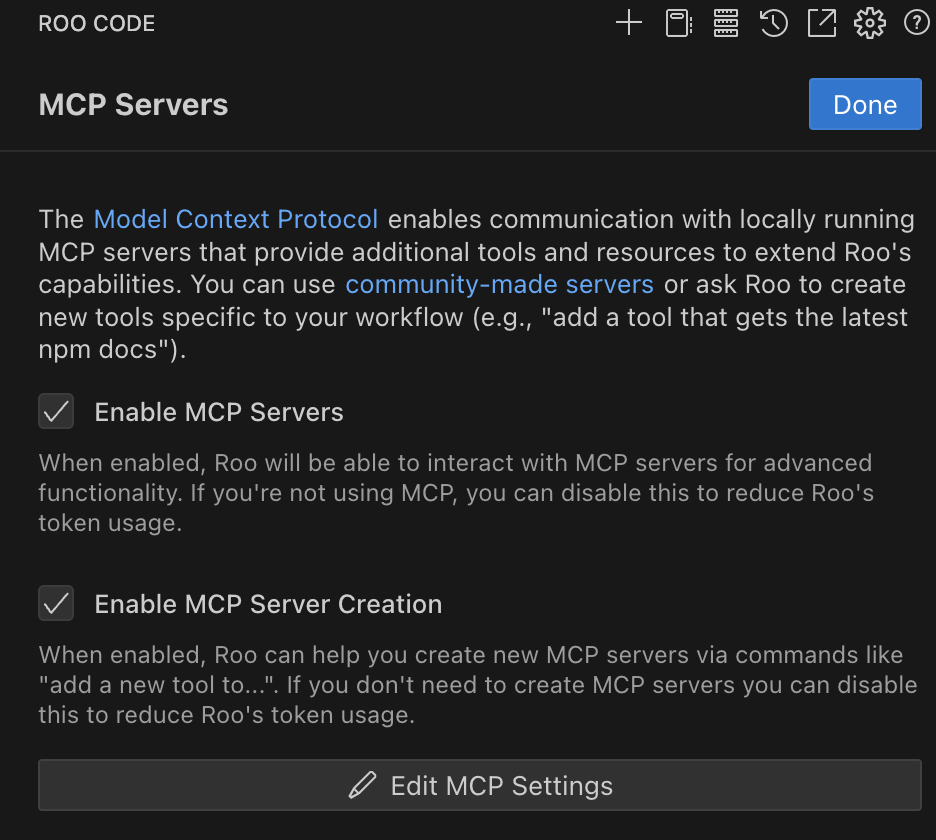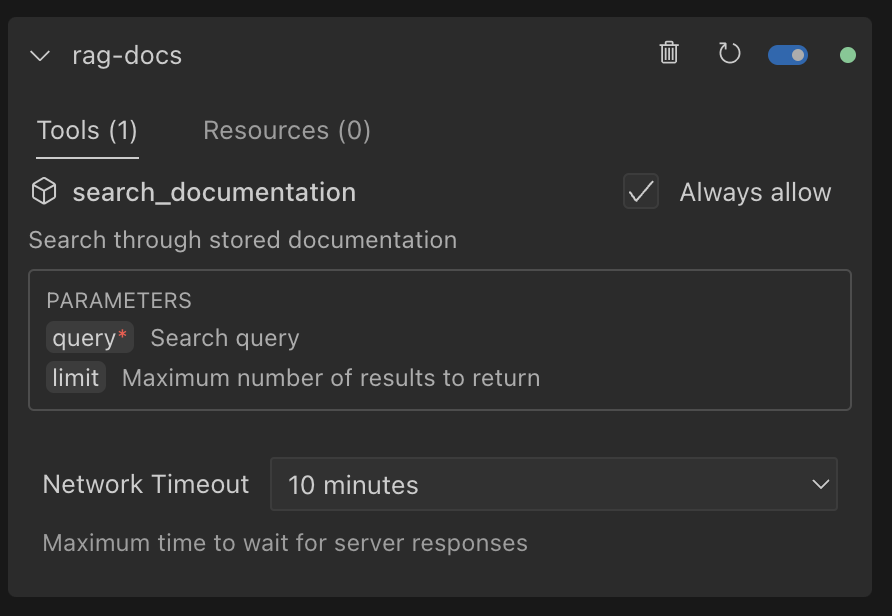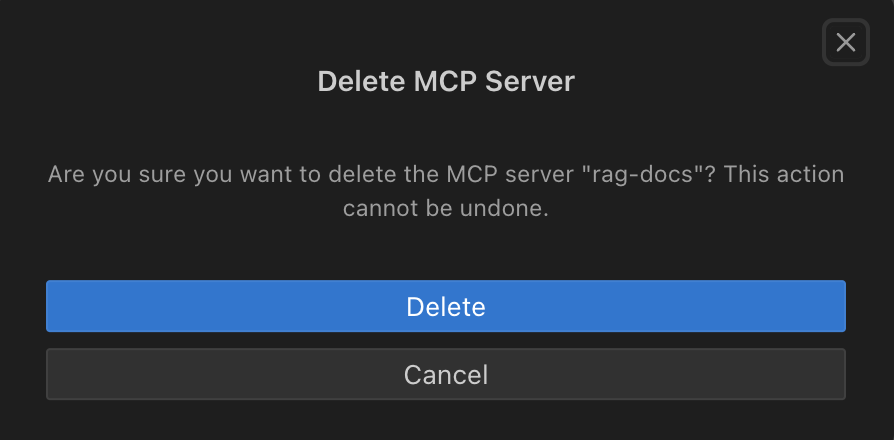Using MCP in ProdE
Model Context Protocol (MCP) extends ProdE's capabilities by connecting to external tools and services. This guide covers everything you need to know about using MCP with ProdE.
Note: All MCP-related settings are global across all workspaces. Any changes you make to MCP configurations will affect all your ProdE projects.
Installing/Editing Your MCP Servers
MCP server configurations are stored in the cline_mcp_settings.json file. You can access it by:
- Click the icon in the top navigation of the ProdE pane

- Click the
Edit MCP Settingsbutton. This will opencline_mcp_settings.json

The file uses a JSON format with a mcpServers object containing named server configurations:
{
"mcpServers": {
"server1": {
"command": "python",
"args": ["/path/to/server.py"],
"env": {
"API_KEY": "your_api_key"
},
"alwaysAllow": ["tool1", "tool2"],
"disabled": false
}
}
}
```
*Example of MCP Server config in ProdE (STDIO Transport)*
### Understanding Transport Types
MCP supports two transport types for server communication:
#### STDIO Transport
Used for local servers running on your machine:
* Communicates via standard input/output streams
* Lower latency (no network overhead)
* Better security (no network exposure)
* Simpler setup (no HTTP server needed)
* Runs as a child process on your machine
For more in-depth information about how STDIO transport works, see [STDIO Transport](server-transports#stdio-transport).
STDIO configuration example:
```json
{
"mcpServers": {
"local-server": {
"command": "node",
"args": ["/path/to/server.js"],
"env": {
"API_KEY": "your_api_key"
},
"alwaysAllow": ["tool1", "tool2"],
"disabled": false
}
}
}
SSE Transport
Used for remote servers accessed over HTTP/HTTPS:
- Communicates via Server-Sent Events protocol
- Can be hosted on a different machine
- Supports multiple client connections
- Requires network access
- Allows centralized deployment and management
For more in-depth information about how SSE transport works, see SSE Transport.
SSE configuration example:
{
"mcpServers": {
"remote-server": {
"url": "https://your-server-url.com/mcp",
"headers": {
"Authorization": "Bearer your-token"
},
"alwaysAllow": ["tool3"],
"disabled": false
}
}
}
Enabling or Disabling MCP Servers
Disabling your MCP Servers here will remove all MCP related logic and definitions from your system prompt, reducing your token usage. This will prevent ProdE from connecting to any MCP servers, and the use_mcp_tool and access_mcp_resource tools will not be available. Check this off if you don't intend to use MCP Servers. This is on by default.
- Click the icon in the top navigation of the ProdE pane
- Check/Uncheck
Enable MCP Servers

Enabling or Disabling MCP Server Creation
Disabling your MCP Server Creation here will just remove the instructions from your system prompt that ProdE uses to write MCP servers while not removing the context related to operating them. This reduces token usage. This is on by default.
- Click the icon in the top navigation of the ProdE pane
- Check/Uncheck
Enable MCP Server Creation

Managing Individual MCP Servers

Each MCP server has its own configuration panel where you can modify settings, manage tools, and control its operation. To access these settings:
- Click the icon in the top navigation of the ProdE pane
- Locate the MCP server you want to manage in the list

Deleting a Server
- Press the next to the MCP server you would like to delete
- Press the
Deletebutton on the confirmation box

Restarting a Server
- Press the button next to the MCP server you would like to restart
Enabling or Disabling a Server
- Press the toggle switch next to the MCP server to enable/disable it
Network Timeout
To set the maximum time to wait for a response after a tool call to the MCP server:
- Click the
Network Timeoutpulldown at the bottom of the individual MCP server's config box and change the time. Default is 1 minute but it can be set between 30 seconds and 5 minutes.

Auto Approve Tools
MCP tool auto-approval works on a per-tool basis and is disabled by default. To configure auto-approval:
- First enable the global "Use MCP servers" auto-approval option in auto-approving-actions
- In the MCP server settings, locate the specific tool you want to auto-approve
- Check the
Always allowcheckbox next to the tool name
When enabled, ProdE will automatically approve this specific tool without prompting. Note that the global "Use MCP servers" setting takes precedence - if it's disabled, no MCP tools will be auto-approved.
Finding and Installing MCP Servers
ProdE does not come with any pre-installed MCP servers. You'll need to find and install them separately.
- Community Repositories: Check for community-maintained lists of MCP servers on GitHub
- Ask ProdE: You can ask ProdE to help you find or even create MCP servers (when "Enable MCP Server Creation" is enabled)
- Build Your Own: Create custom MCP servers using the SDK to extend ProdE with your own tools
For full SDK documentation, visit the MCP GitHub repository.
Using MCP Tools in Your Workflow
After configuring an MCP server, ProdE will automatically detect available tools and resources. To use them:
- Type your request in the ProdE chat interface
- ProdE will identify when an MCP tool can help with your task
- Approve the tool use when prompted (or use auto-approval)
Example: "Analyze the performance of my API" might use an MCP tool that tests API endpoints.
Troubleshooting MCP Servers
Common issues and solutions:
- Server Not Responding: Check if the server process is running and verify network connectivity
- Permission Errors: Ensure proper API keys and credentials are configured in your
cline_mcp_settings.json - Tool Not Available: Confirm the server is properly implementing the tool and it's not disabled in settings
- Slow Performance: Try adjusting the network timeout value for the specific MCP server